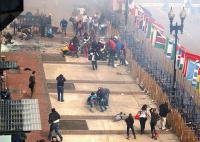-
Europe-wide ballistic information sharing would reduce gun death from terrorism, crime
All countries across Europe are being urged to establish national “Firearms Focal Points” to collect, study, and share information about firearms and ballistics to help reduce the number of deaths and injuries caused by gun crime and terrorism. This is one of the key findings following a 15-month multi-agency research project which looked to analyze the prevalence of gun crime across Europe and, based on the findings, identify initiatives and interventions that could be further pursued and developed to tackle the problem.
-
-
Declassified documents offer insights into ISIS origins, how to defeat the group

Drawing from more than 140 recently declassified documents from the predecessors of the Islamic State, a new study shows that the group has been operating for years with remarkable continuity in its philosophy, methods, and goals, including the long-standing aspiration for creating a caliphate. The documents show that the leadership consciously designed the organization not just to fight, but also to build a state governed by the laws dictated by its strict Islamist ideology.
-
-
Claims of mistreatment of Mau Mau rebels “cannot be fairly tried”: U.K. government
The British government told a court in London that claims from 40,000 Kenyans that they were beaten, raped, and mistreated during the British campaign against the Mau Mau rebellion cannot be fairly tried sixty years later. Responding to a lawsuit which opened at the high court in London this week, and which is expected to go on continue for more than a year, Guy Mansfield QC, representing the Foreign Office, said those accused of having inflicted the violence are now dead or untraceable.
-
-
Terrorists “stockpiling explosives in Europe”: EU security official
Manuel Navarrete Paniagua, the Head of the European Counter Terrorism Center at Europol, said that terrorist cells in the EU are probably stockpiling explosives for future attacks. Europol said it had foiled 211 terror plots in the last year, but that the threat of similar attacks on the scale of November 2015 Paris attacks and the March 2016 attacks in Brussels in March remained a concern.
-
-
Violent extremists are not on the run -- they are on the march: Rep. Michael McCaul

U.S. Rep. Michael McCaul (R-Texas), after returning from a trip to the Middle East, last week shared his frank observation with an audience at George Washington University: “A worldwide terrorist exodus is underway, and we are woefully unprepared to deal with it,” he said. “We are not winning this war,” McCaul said. “Violent extremists are not on the run, as the president says. They are on the march.”
-
-
Mali Islamist will plead guilty in ICC to cultural-destruction war crime

Ahmad al-Faqi al-Mahdi, a jihadist from Mali, has pleaded guilty to destroying ancient world-heritage Islamic sites in Mali. The destruction took place during the short 2012-2-13 reign of the Islamist Ansar Dine movement in break-away northern Mali, which the group called Azawad. Mahdi is he first person to face cultural destruction-related war crimes charges before the International Criminal Court (ICC).
-
-
Study probes impact of terror on business travelers, managers
A joint study of terror’s impact on business travelers and business travel managers revealed surprising results, especially with regard to traveler fears and anxiety. Among other findings, the study found that 31 percent of business travelers worry that a reluctance to travel could hurt their career, and that 6 percent would not feel comfortable expressing their concerns to upper management.
-
-
Taliban leader Mullah Mansour posed “imminent threat” to U.S.: Pentagon

The Pentagon has said it killed Taliban leader Mullah Akhtar Mansour because he posed a danger to the United States. The Islamist militant chief was killed in a U.S. strike in Pakistan last week. President Obama called the death of Mansour “an important milestone,” and that the United States had “removed the leader of an organization that has continued to plot against and unleash attacks on American and coalition forces.”
-
-
ISIS bomb attacks in Syria’s Alawite heartland kill 148
ISIS militants set off bombs that killed more than 140 people in the Syrian towns of Jableh and Tartous, in the Assad regime’s Alawite-controlled coastal heartland. The Alawite region on north-west Syria, from which the Assad family and most of Syria’s higher echelon hail, has so far escaped the worst of the fighting in Syria’s civil war.
-
-
Gazans fear being used as human shields as Hamas builds tunnels under homes
Palestinians in the Gaza Strip increasingly fear that the ongoing construction of Hamas tunnels in residential areas means that their lives will be in danger if a future war breaks out between the terrorist group and Israel. While Israel destroyed 32 terror tunnels during the 2014 war, Israeli officials have been warning for some time that Hamas has rebuilt much of its underground infrastructure.
-
-
Biodefense Panel welcomes key provision in defense authorization bill
In October 2015, the Blue Ribbon Study Panel on Biodefense found that insufficient federal coordination on strategy, budgeting, and policy; inadequate collaboration with other levels of government and the private sector; and lagging innovation in areas like biosurveillance and medical countermeasure development make the United States vulnerable to biological attacks and infectious disease outbreaks. The Panel welcomed the passing by the House of the National Defense Authorization Act, H.R. 4909, which includes a provision addressing one of the Panel’s most important recommendations.
-
-
Update on earthquakes: Newest results from Oklahoma Commission look “encouraging”
The Oklahoma Corporation Commission (OCC), the regulatory agency overseeing the state’s oil and gas industry, now has data that may suggest their directives to owners of production and induction wells have successfully contributed to a decline in seismic activity in the most volatile areas prone to earthquakes.Scientists at the Oklahoma Geological Survey (OGS) continue to remind the public that there are a wide variety of unanswered questions about immediate and long-term remedies even with the new directives in place.
-
-
ISIS conducting chemical experiments on its prisoners
In the ace of sustained attacks by coalition forces, ISIS has moved its chemical weapons labs to densely populated residential areas in Mosul — and is testing homemade chlorine and mustard gas on its prisoners held in different facilities in and around the city. ISIS has been working in chemical weapons for a while, relying on the expertise of scientists who served in the chemical weapons complex of Saddam Hussein, but also on Europeans with chemical degrees from leading European universities.
-
-
ISIS leader calls on U.S., European followers to attack in U.S. and Europe during Ramadan

Abu Mohammed al-Adnani, a close aide and a possible successor to leader Abu Bakr al-Baghdadi, has called on the international followers of ISIS to carry out attacks on civilians during the holy month of Ramadan. He said that lone wolf attacks in the United States and Europe were “dearer to us than the biggest action by us” in Iraq and Syria. The message also contained references to recent military setbacks the group has suffered.
-
-
ISIS urges Indian Muslims to avenge killing of Muslims

ISIS, in a surprising move, has appealed to India’s Muslim minority, calling on them to avenge the deaths of Muslims killed during riots in Indian Prime Minister Narendra Modi’s home state of Gujarat. Only a handful of India’s 160 million Muslims have joined ISIS. Indian leaders has stressed that the reason is the strength of the country’s secular democracy.
-
More headlines
The long view
Factories First: Winning the Drone War Before It Starts
Wars are won by factories before they are won on the battlefield,Martin C. Feldmann writes, noting that the United States lacks the manufacturing depth for the coming drone age. Rectifying this situation “will take far more than procurement tweaks,” Feldmann writes. “It demands a national-level, wartime-scale industrial mobilization.”
No Nation Is an Island: The Dangers of Modern U.S. Isolationism
The resurgence of isolationist sentiment in American politics is understandable but misguided. While the desire to refocus on domestic renewal is justified, retreating from the world will not bring the security, prosperity, or sovereignty that its proponents promise. On the contrary, it invites instability, diminishes U.S. influence, and erodes the democratic order the U.S. helped forge.
Fragmented by Design: USAID’s Dismantling and the Future of American Foreign Aid
The Trump administration launched an aggressive restructuring of U.S. foreign aid, effectively dismantling the United States Agency for International Development (USAID). The humanitarian and geopolitical fallout of the demise of USAID includes shuttered clinics, destroyed food aid, and China’s growing influence in the global south. This new era of American soft power will determine how, and whether, the U.S. continues to lead in global development.
Water Wars: A Historic Agreement Between Mexico and US Is Ramping Up Border Tension
As climate change drives rising temperatures and changes in rainfall, Mexico and the US are in the middle of a conflict over water, putting an additional strain on their relationship. Partly due to constant droughts, Mexico has struggled to maintain its water deliveries for much of the last 25 years, deliveries to which it is obligated by a 1944 water-sharing agreement between the two countries.
How Disastrous Was the Trump-Putin Meeting?
In Alaska, Trump got played by Putin. Therefore, Steven Pifer writes, the European leaders and Zelensky have to “diplomatically offer suggestions to walk Trump back from a position that he does not appear to understand would be bad for Ukraine, bad for Europe, and bad for American interests. And they have to do so without setting off an explosion that could disrupt U.S.-Ukrainian and U.S.-European relations—all to the delight of Putin and the Kremlin.”
How Male Grievance Fuels Radicalization and Extremist Violence
Social extremism is evolving in reach and form. While traditional racial supremacy ideologies remain, contemporary movements are now often fueled by something more personal and emotionally resonant: male grievance.
